|
|
|
Sort Order |
|
|
|
Items / Page
|
|
|
|
|
|
|
| Srl | Item |
| 1 |
ID:
173271
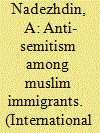

|
|
|
|
|
| Summary/Abstract |
EXPERTS have for years been pointing to mounting xenophobic, anti-immigrant, and radical sentiments among the population of Europe. However, recently it is not only refugees and economic migrants from the Middle East and North Africa (MENA region) who have been facing hostility but also Jews who have lived in Europe permanently and have been integrated into European society. Usually, European anti-Semitism has been blamed on right-wing extremists and radicals, especially those in Hungary and Poland.1 There occur random instances of trivial anti-Semitic behavior, for example at school or in companies, that are not investigated or taken into account in police statistics.
|
|
|
|
|
|
|
|
|
|
|
|
|
|
|
|
| 2 |
ID:
082407
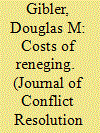

|
|
|
|
|
| Publication |
2008.
|
| Summary/Abstract |
Reputations are supposed to matter. Decision makers consistently refer to reputations for resolve, and international relations theories confirm the value of being able to credibly signal intentions during times of crisis. However, empirical support for the effects of reputation has been lacking. Problems of strategic selection have hampered previous quantitative tests, and the qualitative literature provides scant support for the concept in individual crises. In this article, the author shifts the focus from crisis behavior to alliance commitments and examines the effects that opportunities to uphold previous commitments have on future alliance commitments and conflicts. The results demonstrate that alliance reputations do affect both alliance formation and dispute behavior
|
|
|
|
|
|
|
|
|
|
|
|
|
|
|
|
| 3 |
ID:
073107
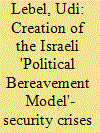

|
|
|
| 4 |
ID:
162437
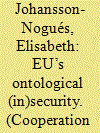

|
|
|
|
|
| Summary/Abstract |
The 2016 EU Global Strategy and the 2015 European Neighbourhood Policy (ENP) review have made stabilisation of the ENP area one of their main priorities. Our argument here, however, is that the Global Strategy and the ENP review not only seek to mitigate the numerous crises currently affecting the neighbourhood; they also aim to address a set of intra-EU vulnerabilities linked to events in the ENP area that are threatening the EU’s own ontological security. We employ narrative analysis to explore how insecurity in the EU and in the ENP area is affecting the EU’s relation to the neighbourhood-other and its understanding of the EU-self. Our main findings point to the Global Strategy and the ENP review providing ample measures to stabilise the neighbourhood. However, whether they have provided a sufficiently compelling narrative to enable the emergence of new emotional structures for the EU and its member states to make sense of themselves and their relation to the neighbourhood-other remains an open question.
|
|
|
|
|
|
|
|
|
|
|
|
|
|
|
|
| 5 |
ID:
109863
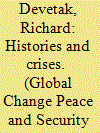

|
|
|
| 6 |
ID:
099085
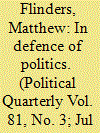

|
|
|
|
|
| Publication |
2010.
|
| Summary/Abstract |
In this, my inaugural lecture, I wanted to sing out in praise of politics! This seemed such a good idea twelve months ago, but now in the wake of even more stories about MPs not declaring foreign trips and former ministers demanding 'cash for access' the idea of trying to defend politicians and praise politics suddenly seems like a very bad idea. And yet it is exactly because politics is held in such low esteem that the lecture is so important. Democratic politics matters because it achieves far more than we generally give it credit for. I want to rediscover the essence and arguments of Bernard Crick's classic book In Defence of Politics because its arguments are more appropriate today than when they were first published in 1962.
|
|
|
|
|
|
|
|
|
|
|
|
|
|
|
|
| 7 |
ID:
153342
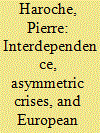

|
|
|
|
|
| Summary/Abstract |
Although international crises are often believed to represent windows of opportunity to strengthen European defence cooperation, recent crises have not seemed to produce a clear convergence of European Union (EU) member states’ security interests. This article seeks to address this puzzle by arguing that European defence cooperation is a response to crises that place European states in a situation of military interdependence. Conversely, asymmetric crises, i.e. crises that affect European states unevenly, encourage those states to maintain their autonomy of action. This theoretical argument is supported by two case studies: the failure of the European Defence Community in the early 1950s and the current difficulties experienced by the EU’s military operations. These two cases illustrate a striking continuity in that, because of (neo)colonial ties in particular, European states are often unevenly affected by international crises, which tends to make defence cooperation less effective.
|
|
|
|
|
|
|
|
|
|
|
|
|
|
|
|
| 8 |
ID:
135066
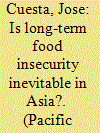

|
|
|
|
|
| Summary/Abstract |
This article questions two widely accepted claims on long-term food insecurity in Asia, the world's (heterogeneous) region with the largest number of undernourished individuals. The first claim is that food production may not grow as fast as the pace of population growth in Asia, which will reach 5 billion by 2050. The second claim is that an unstoppable emergence of a middle class in Asia will dramatically change the composition of food demand. On the first claim, the region's contribution to high and volatile international food prices is well known, but Asia's potentially positive contributions toward future price uncertainty and productivity growth are much less cited. On the second claim, the changing composition of future food demand in the region will depend on the extent that poverty reduction effectively leads to middle class expansion, which it is not an automatic process, and its extent still remains to be seen. Past evidence teaches us that poverty reduction on its own will not do the job of eradicating hunger, nor will only increasing food production. The jury is still out, but doomsday predictions are not necessarily justified.
|
|
|
|
|
|
|
|
|
|
|
|
|
|
|
|
| 9 |
ID:
161385
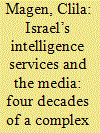

|
|
|
|
|
| Summary/Abstract |
This article provides an overview of the relationship of two Israeli intelligence services and the media over four decades. It explores how Israel’s external and internal intelligence services have dealt with the public sphere in times of publicised crises, and analyses the main differences between the internal and external intelligence services when addressing the media.
|
|
|
|
|
|
|
|
|
|
|
|
|
|
|
|
| 10 |
ID:
125112


|
|
|
|
|
| Publication |
2013.
|
| Summary/Abstract |
Using a simulated bilateral negotiation over several security issues, the authors explore how variations in the negotiation context influence reactions to a negotiating crisis. Negotiators were primed to focus on one of three aspects of the context: transaction costs, dependence, or shared identity. They were asked to respond to the crisis with a decision to reach an immediate agreement, continue negotiating, or reframe the issues. The results showed that mutual dependence (unattractive alternatives) led to reframing (turning points) whereas high transaction costs led to a preference for continuing the negotiation. Shared identity did not affect negotiators preference across alternative courses of action. Affective trust amplified the impact of dependence and transaction costs: the decision to reframe was made more often by negotiators who reported low affective trust, whereas the decision to reach immediate agreement was made more often by negotiators who reported high affective trust. High cognitive trust encouraged negotiators to continue the negotiation if they had a shared identity or if transaction costs were high. Applications were made to real-world cases and implications were developed for Relational Order theory and for further research.
|
|
|
|
|
|
|
|
|
|
|
|
|
|
|
|
| 11 |
ID:
178134


|
|
|
|
|
| Summary/Abstract |
The necessity of making sense of our current moment, one characterized – as Andreas Bieler and Adam David Morton suggest – by the interconnected forces of global capitalism, global war and global crisis is clear. Given the continuing body counts attributable to the prioritisation of rapid economic and industrial growth over ecology, to the expansion of expeditionary and pre-emptive warfare, and to the liberalisation and deregulation of economies that has reduced social welfare safety nets around the globe to tatters, it is pertinent to ask, as Bieler and Morton do, ‘what had to have happened in the past for capitalism as a mode of production to emerge and consolidate?’.1 One of Bieler and Morton’s central aims in approaching this question is to revolt against the ‘violence of abstraction’, which drawing on Sayer’s seminal work,2 they describe as eschewing the fetishisation of concepts in favour of analysing social relations rooted in specific historical and sociological practices.3 Feminist scholars have similarly asked how patriarchy, as a set of power relations, has come about, and urged us to pay very close attention to how historical social relations in different parts of the world shape people’s presents. Just as Bieler and Morton argue that historical materialism ‘does not relegate the “economic” or the “political” to spatially separate spheres but conceives of the social constitution of the economy so that relations of production are embodied in juridical-political and ideological forms’,4 so too have feminists shown how the political, economic, juridical and ideological have worked with and through each other to substantiate patriarchal social relations that often normalise the spatial separation of social spheres. Although the book engages directly and productively with some branches of feminist thought, reflecting on points of convergence and divergence reveals some of the book’s blind spots and wider contributions. In my contribution to this forum, I consider what opportunities the book offers for rethinking feminist critique after the postmodern turn and in an age of crises, and what contemporary feminist theory in turn offers historical materialism. I ultimately aim to show how the present, and the historical and sociological forces that shape it, is necessarily both a historical materialist and feminist moment.
|
|
|
|
|
|
|
|
|
|
|
|
|
|
|
|
| 12 |
ID:
146197
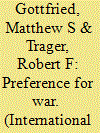

|
|
|
|
|
| Summary/Abstract |
We conduct a survey experiment to examine the effects of international compromise, war, and foreign government rhetoric on presidential approval. We find that, in certain conflicts, popular approval tracks fairness heuristics—leaders seeking to maximize voter approval prefer equitable divisions of disputed goods and are risk acceptant for divisions below this threshold. Moreover, aggressive rhetoric by a foreign leader increases domestic leaders’ expected approval from war, decreases the value of compromise, and provides them with powerful incentives to fight harder. Thus, leaders motivated by popular approval have preferences that are inconsistent with the non-satiated, risk-averse preferences defined over shares of an objective good—that is, with those that much of the rationalist literature on conflict assumes. Fairness heuristics and the rhetorical framing of disputes during the conflict process may be at least as important as material factors in understanding why some disputes result in war.
|
|
|
|
|
|
|
|
|
|
|
|
|
|
|
|
| 13 |
ID:
089418
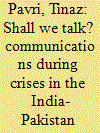

|
|
|
|
|
| Publication |
2009.
|
| Summary/Abstract |
This article examines selected crises that have arisen between India and Pakistan in the post-independence period and asks if communications between the two sides, whether direct or indirect, have made a difference in whether the crisis has escalated to war or been settled short of it. It finds that both kinds of communication have succeeded in building trust during escalating crises and that this may have led to settlements short of war. It also suggests that the content of communication is important and that positive messages sent through either channel have led to successful outcomes. It calls for the maintenance of sustained and dedicated communication channels that will remain in place and continue to build trust after crises are settled, rather than the ad hoc ways in which the two countries have communicated during crises thus far.
|
|
|
|
|
|
|
|
|
|
|
|
|
|
|
|
|
|
|
|
|